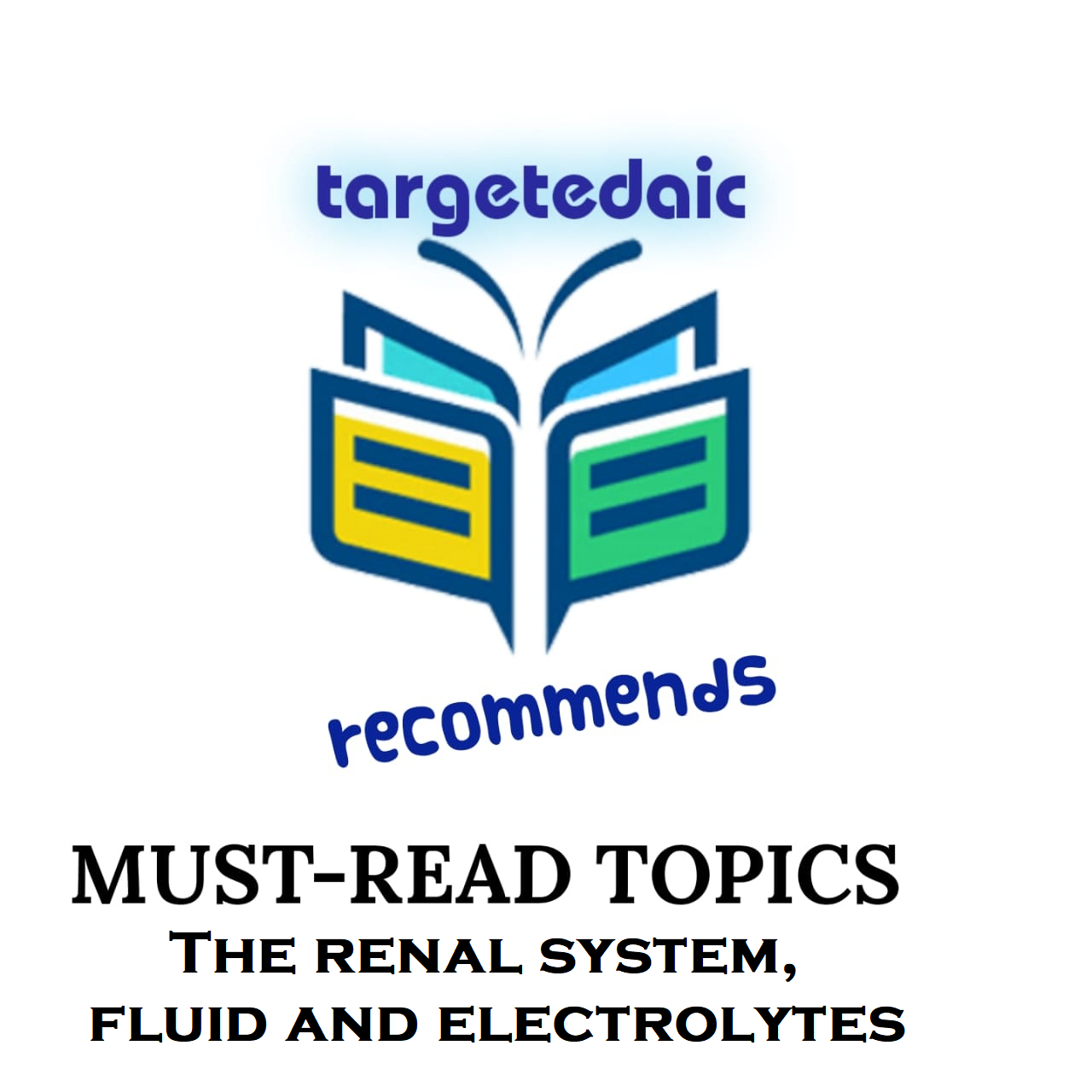Case scenarios and questions based on the renal system, fluid and electrolytes are among the most frequently asked topics in both parts of the EDAIC examinations. Fortunately, the questions revolve around limited topics and specific pathologies, that are not very difficult to memorise and retain, provided you know where to concentrate your efforts. This list includes the most common exam questions that you are likely to be asked in the EDAIC examination. Although the examiner is at liberty to test or ask anything, there are all-time favourites that you must know.
To make the challenging terrain a little less painful, we have tried to compile a list of the most important topics to be read from these systems, a bare minimum yet essential topics’ compilation.
Targetedaic recommends: What to read in the renal system, fluid and electrolytes
RENAL, ELECTROLYTES AND FLUID DYNAMICS
- The function of nephron with diagram (sodium, glucose, bicarbonate, potassium handling by nephron)
- Define osmolality and osmolarity and how to calculate osmolality of 50% mannitol.
- Draw and explain the distribution of 1 litre of normal saline/5d/water in different body compartments
- Starling forces and oedema formation.
- Crystalloids vs colloids.
- Different types of colloids & side effects.
- Physical properties of intravenous fluids. Compare osmolarity, pH, side effects.
- Acute renal failure, RIFLE criteria
- CKD
- Erythropoietin
- Describe buffer systems in the body and next to their relative importance.
- Physiological implications of acute and chronic renal failure
- The hormonal function of the kidney in details
- Hemodialysis. Types. Complications. Aluminium toxicity.
- Hemodialysis in CRF patients with coagulopathy
- Myoglobinuria
- Rhabdomyolysis – causes, diagnosis, management and treatment of hyperkalemia
Electrolytes
a. Calcium/ sodium/ potassium/ phosphorus homeostasis and its role in the body
b. Hypo and hypernatremia
c. K- regulation
d. Hypo/ Hyperkalemia.
e. Hypo- and hypercalcemia
f. Causes, treatment and ECG changes in above
• Anaesthesia for renal transplantation.
• TURP syndrome. How will you diagnose? Management.
Case scenarios:
a. ERSD Pt for A-V fistula: -Problems of this Pt preparation. Which anaesthesia can be given. Pt refused LA. What can you do? Discuss GA for Renal Pt ( induction agents, RSI for renal Pt, induction dose immediately after dialysis and 2 days after dialysis)
b. Sixty-three-year-old with cancer colon and received chemotherapy but stopped 6 months ago due to cardiac and renal toxicity, coming for liver resection due to single metastasis, splenic injury intraoperative but managed to save the spleen. Nurse calling you in the recovery for low urine output.
c. End-stage chronic renal failure coming for av fistula. Your anaesthetic management.
d. The patient had splenectomy with intraoperative bleeding and was transfused and got stable with extensive fluid support. He was admitted to an intensive care postoperative. In 1st 12 Hrs, he experienced anuria/ Oliguria followed by sudden onset tachycardia. Explain what to expect? What is the best 1st choice management?
FOR MUST-READ TOPICS IN THE RESPIRATORY SYSTEMS, CLICK HERE.
FOR MUST-READ TOPICS IN THE NERVOUS SYSTEM, CLICK HERE.
FOR MUST-READ TOPICS IN THE ENDOCRINE, METABOLIC AND NEUROMUSCULAR SYSTEMS, CLICK HERE.
FOR MUST-READ TOPICS IN THE PAIN AND REGIONAL ANAESTHESIA, CLICK HERE.
FOR MUST-READ TOPICS IN THE PHARMACOLOGY, CLICK HERE.
FOR MUST-READ TOPICS IN THE CRITICAL CARE AND EMERGENCY, CLICK HERE.
FOR MUST-READ TOPICS IN THE PREGNANCY, OBSTETRICS AND PAEDIATRICS CLICK HERE.
JOIN OUR FACEBOOK GROUP TO STAY UPDATED WITH OUR UPDATES AND UPLOADS.
-
 Radiology for the Anaesthetist₹1500.00
Radiology for the Anaesthetist₹1500.00 -
 Cardiovascular physiology module by targetedaic₹1000.00
Cardiovascular physiology module by targetedaic₹1000.00 -
 Statistics module by targetedaic₹500.00
Statistics module by targetedaic₹500.00



I am preparing for my exam ( EDAIC) l will appreciate all the necessary materials to be used
Hi DR Ojediran
can you let us know which year and which part are you preparing for?